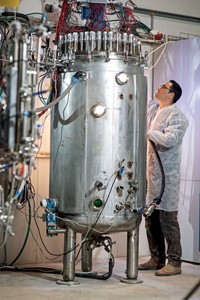Advertisement
Grab your lab coat. Let's get started
Welcome!
Welcome!
Create an account below to get 6 C&EN articles per month, receive newsletters and more - all free.
It seems this is your first time logging in online. Please enter the following information to continue.
As an ACS member you automatically get access to this site. All we need is few more details to create your reading experience.
Not you? Sign in with a different account.
Not you? Sign in with a different account.
ERROR 1
ERROR 1
ERROR 2
ERROR 2
ERROR 2
ERROR 2
ERROR 2
Password and Confirm password must match.
If you have an ACS member number, please enter it here so we can link this account to your membership. (optional)
ERROR 2
ACS values your privacy. By submitting your information, you are gaining access to C&EN and subscribing to our weekly newsletter. We use the information you provide to make your reading experience better, and we will never sell your data to third party members.
Fermentation
Bezos creates food protein R&D network
The initiative aims to create fermentation processes for sustainable, low-cost protein
by Alex Scott
July 3, 2024

Imperial College London has opened an R&D center, the Bezos Centre for Sustainable Protein, that will use biotechnology to develop fermentation processes for making alternative food proteins. The center will receive $30 million over 5 years from Amazon’s founder, Jeff Bezos, via the Bezos Earth Fund.
The center will be part of a network of open-access R&D labs for alternative proteins established by the billionaire as part of a $100 million commitment to alternative proteins and an overall $1 billion commitment to transform food production.
The protein initiative is designed to bring together academia and industry to research, create, and commercialize new technologies; to train the emerging industry’s workforce; and to gauge consumers’ protein preferences.
Seven of Imperial College’s academic departments will work with the center on fermentation, meat cultivation, bioprocessing and automation, nutrition, and artificial intelligence and machine learning. Its center will collaborate with more than 65 academic and commercial partners in the UK and abroad, including the Bezos Center for Sustainable Protein at North Carolina State University. The US school opened its center at the end of May with $30 million in funding. It is partnering with a companies that include Believer Meats, Cargill, and Givaudan.
“This work will help ensure that our future includes more protein options—and that they taste great, are nutritious and come at low cost,” Andrew Steer, CEO of the Bezos Earth Fund, says in a press release. “By 2050 the world population will be over 10 billion, so now is the time to rethink the way we produce and consume food.”
Researchers at the Bezos protein R&D centers are likely to follow the work of a swath of start-ups that have been developing fermentation processes to make proteins. The firms claim that their processes can disassociate food production from land or sea and realize substantial environmental benefits.
One of these firms, Calysta, produces its FeedKind protein brand by turning methane-consuming microorganisms into fish or animal feed. Other start-ups, such as Finland’s Solar Foods, are working on fermentation processes involving single-cell soil bacteria that consume hydrogen.



Join the conversation
Contact the reporter
Submit a Letter to the Editor for publication
Engage with us on Twitter